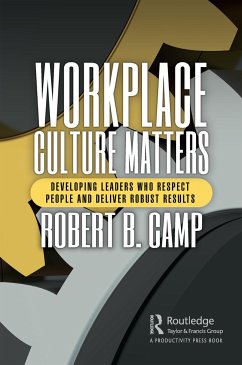Robert B Camp
Workplace Culture Matters
Developing Leaders Who Respect People and Deliver Robust Results
Robert B Camp
Workplace Culture Matters
Developing Leaders Who Respect People and Deliver Robust Results
- Gebundenes Buch
- Merkliste
- Auf die Merkliste
- Bewerten Bewerten
- Teilen
- Produkt teilen
- Produkterinnerung
- Produkterinnerung
Written in a novel format, Culture Matters addresses the challenge of changing a "sick" culture. Some organizations wake up one day and realize they have become something they never intended.
Andere Kunden interessierten sich auch für
![Revolutionizing the Online Learning Journey Revolutionizing the Online Learning Journey]() William J RothwellRevolutionizing the Online Learning Journey144,99 €
William J RothwellRevolutionizing the Online Learning Journey144,99 €![Re-Envisioning Organizations Through Transformational Change Re-Envisioning Organizations Through Transformational Change]() Re-Envisioning Organizations Through Transformational Change174,99 €
Re-Envisioning Organizations Through Transformational Change174,99 €![Making It All Work Making It All Work]() John SchultzMaking It All Work197,99 €
John SchultzMaking It All Work197,99 €![Competitive Innovation and Improvement Competitive Innovation and Improvement]() Kieron DeyCompetitive Innovation and Improvement96,99 €
Kieron DeyCompetitive Innovation and Improvement96,99 €![Succession Planning for Small and Family Businesses Succession Planning for Small and Family Businesses]() Succession Planning for Small and Family Businesses142,99 €
Succession Planning for Small and Family Businesses142,99 €![Assessment and Diagnosis for Organization Development Assessment and Diagnosis for Organization Development]() Assessment and Diagnosis for Organization Development228,99 €
Assessment and Diagnosis for Organization Development228,99 €![Strategy Savvy Strategy Savvy]() Hesham DinanaStrategy Savvy198,99 €
Hesham DinanaStrategy Savvy198,99 €-
-
-
Written in a novel format, Culture Matters addresses the challenge of changing a "sick" culture. Some organizations wake up one day and realize they have become something they never intended.
Hinweis: Dieser Artikel kann nur an eine deutsche Lieferadresse ausgeliefert werden.
Hinweis: Dieser Artikel kann nur an eine deutsche Lieferadresse ausgeliefert werden.
Produktdetails
- Produktdetails
- Verlag: Taylor & Francis
- Seitenzahl: 302
- Erscheinungstermin: 22. Dezember 2022
- Englisch
- Abmessung: 229mm x 152mm x 19mm
- Gewicht: 590g
- ISBN-13: 9781032372556
- ISBN-10: 1032372559
- Artikelnr.: 65925232
- Herstellerkennzeichnung
- Libri GmbH
- Europaallee 1
- 36244 Bad Hersfeld
- gpsr@libri.de
- Verlag: Taylor & Francis
- Seitenzahl: 302
- Erscheinungstermin: 22. Dezember 2022
- Englisch
- Abmessung: 229mm x 152mm x 19mm
- Gewicht: 590g
- ISBN-13: 9781032372556
- ISBN-10: 1032372559
- Artikelnr.: 65925232
- Herstellerkennzeichnung
- Libri GmbH
- Europaallee 1
- 36244 Bad Hersfeld
- gpsr@libri.de
A graduate of the US Military Academy at West Point, Robert Camp began his career in one of this country's foremost schools of leadership. Yet, like most, he gained his real impression of the skill by watching leaders. He came to realize that leadership is a precious gift that far too many fail to recognize. In the mid-1980s, as Americans began to watch markets they had created be penetrated, then dominated by Japan, Robert started reading the literature trickling out of that country. Each new book pointed to a new technique. "Statistical process control (SPC) is how they're doing it!" proclaimed some. "It's quality circles," countered others. Still others claimed it was just-in-time (JIT) manufacturing. As it turned out, none was right; all were right. Over time, as a more complete picture formed, Robert learned that it was the combination of those tools that gave the Japanese their considerable edge. Still, the picture was not quite complete, and it wasn't until the late 1990s that the world came to realize that the tools alone would never make an organization Lean, because their results couldn't be sustained. By then, Robert had made Lean a full-time profession. Over and over he transformed organizations. Some succeeded, but most failed. He tried to make heads or tails of the circumstances that made the difference. The answer, he discovered, was right under his nose all the time. The difference was leadership. He learned that many have been content to manage and call it leadership. Management, however, isn't leadership. In fact, it's a far cry from there. Management faces backward, analyzing yesterday's data and perfecting it today. It's an extremely valuable skill, and much-needed, but it's not leadership. Leadership, as Robert sees it, is the ability to look forward, over the horizon and through the haze of battle, to define, then communicate, a new course of action and compel others to follow. Robert has had the good fortune to work for some of this country's biggest and most successful organizations. Throughout his career, he's been afforded the privilege of working under great men and women who have taught him both in word and deed.
About the Author. Introduction. Chapter 1 The Last Straw. Chapter 2 Legal
Hot Water. Chapter 3 Unraveling the Ball of Twine. Chapter 4 What Goes
Around ... Chapter 5 Any Port in a Storm. Chapter 6 Monday: Starting from
the Ground Up. Chapter 7 Tuesday: The Work Begins. Chapter 8 Wednesday: The
Tide Shifts. Chapter 9 Thursday: "All In!" Chapter 10 Friday: A Long, Long
Day. Chapter 11 The Plan. Chapter 12 Monday: A New Leaf. Chapter 13 Monday
Continued: Clearing the Air. Chapter 14 Tuesday: Take Two. Chapter 15
Leading from the Top. Chapter 16 California or Bust. Chapter 17 Oakland.
Chapter 18 First Who. Chapter 19 Another Bite of the Apple. Chapter 20 A
Lot to Cogitate. Chapter 21 Thursday: Drilling Deeper. Chapter 22 Out of
the Blue. Chapter 23 Dialog as a Way of Coaching. Chapter 24 A Slight
Hiccup. Chapter 25 Closings and Coaching. Chapter 26 Change at Last.
Chapter 27 Walking. Chapter 28 Finally, a Break. Chapter 29 Our Best
Selves. Chapter 30 The Map to Success. Chapter 31 An Illogical Flow.
Chapter 32 Unkinking the Hose. Chapter 33 Confrontation. Chapter 34 The
Turning Point. Chapter 35 A Second Start. Chapter 36 Truly Leading. Chapter
37 Standard Work and Water Spiders. Chapter 38 Putting It All Together.
Chapter 39 Winning Back Time. Chapter 40 Acknowledging Values. Chapter 41
Leader Standard Work. Chapter 42 Objective Performance Evaluation. Chapter
43 Coaching the Middle. Chapter 44 Tim and Patty. Chapter 45 That's a Wrap!
Index.
Hot Water. Chapter 3 Unraveling the Ball of Twine. Chapter 4 What Goes
Around ... Chapter 5 Any Port in a Storm. Chapter 6 Monday: Starting from
the Ground Up. Chapter 7 Tuesday: The Work Begins. Chapter 8 Wednesday: The
Tide Shifts. Chapter 9 Thursday: "All In!" Chapter 10 Friday: A Long, Long
Day. Chapter 11 The Plan. Chapter 12 Monday: A New Leaf. Chapter 13 Monday
Continued: Clearing the Air. Chapter 14 Tuesday: Take Two. Chapter 15
Leading from the Top. Chapter 16 California or Bust. Chapter 17 Oakland.
Chapter 18 First Who. Chapter 19 Another Bite of the Apple. Chapter 20 A
Lot to Cogitate. Chapter 21 Thursday: Drilling Deeper. Chapter 22 Out of
the Blue. Chapter 23 Dialog as a Way of Coaching. Chapter 24 A Slight
Hiccup. Chapter 25 Closings and Coaching. Chapter 26 Change at Last.
Chapter 27 Walking. Chapter 28 Finally, a Break. Chapter 29 Our Best
Selves. Chapter 30 The Map to Success. Chapter 31 An Illogical Flow.
Chapter 32 Unkinking the Hose. Chapter 33 Confrontation. Chapter 34 The
Turning Point. Chapter 35 A Second Start. Chapter 36 Truly Leading. Chapter
37 Standard Work and Water Spiders. Chapter 38 Putting It All Together.
Chapter 39 Winning Back Time. Chapter 40 Acknowledging Values. Chapter 41
Leader Standard Work. Chapter 42 Objective Performance Evaluation. Chapter
43 Coaching the Middle. Chapter 44 Tim and Patty. Chapter 45 That's a Wrap!
Index.
About the Author. Introduction. Chapter 1 The Last Straw. Chapter 2 Legal
Hot Water. Chapter 3 Unraveling the Ball of Twine. Chapter 4 What Goes
Around ... Chapter 5 Any Port in a Storm. Chapter 6 Monday: Starting from
the Ground Up. Chapter 7 Tuesday: The Work Begins. Chapter 8 Wednesday: The
Tide Shifts. Chapter 9 Thursday: "All In!" Chapter 10 Friday: A Long, Long
Day. Chapter 11 The Plan. Chapter 12 Monday: A New Leaf. Chapter 13 Monday
Continued: Clearing the Air. Chapter 14 Tuesday: Take Two. Chapter 15
Leading from the Top. Chapter 16 California or Bust. Chapter 17 Oakland.
Chapter 18 First Who. Chapter 19 Another Bite of the Apple. Chapter 20 A
Lot to Cogitate. Chapter 21 Thursday: Drilling Deeper. Chapter 22 Out of
the Blue. Chapter 23 Dialog as a Way of Coaching. Chapter 24 A Slight
Hiccup. Chapter 25 Closings and Coaching. Chapter 26 Change at Last.
Chapter 27 Walking. Chapter 28 Finally, a Break. Chapter 29 Our Best
Selves. Chapter 30 The Map to Success. Chapter 31 An Illogical Flow.
Chapter 32 Unkinking the Hose. Chapter 33 Confrontation. Chapter 34 The
Turning Point. Chapter 35 A Second Start. Chapter 36 Truly Leading. Chapter
37 Standard Work and Water Spiders. Chapter 38 Putting It All Together.
Chapter 39 Winning Back Time. Chapter 40 Acknowledging Values. Chapter 41
Leader Standard Work. Chapter 42 Objective Performance Evaluation. Chapter
43 Coaching the Middle. Chapter 44 Tim and Patty. Chapter 45 That's a Wrap!
Index.
Hot Water. Chapter 3 Unraveling the Ball of Twine. Chapter 4 What Goes
Around ... Chapter 5 Any Port in a Storm. Chapter 6 Monday: Starting from
the Ground Up. Chapter 7 Tuesday: The Work Begins. Chapter 8 Wednesday: The
Tide Shifts. Chapter 9 Thursday: "All In!" Chapter 10 Friday: A Long, Long
Day. Chapter 11 The Plan. Chapter 12 Monday: A New Leaf. Chapter 13 Monday
Continued: Clearing the Air. Chapter 14 Tuesday: Take Two. Chapter 15
Leading from the Top. Chapter 16 California or Bust. Chapter 17 Oakland.
Chapter 18 First Who. Chapter 19 Another Bite of the Apple. Chapter 20 A
Lot to Cogitate. Chapter 21 Thursday: Drilling Deeper. Chapter 22 Out of
the Blue. Chapter 23 Dialog as a Way of Coaching. Chapter 24 A Slight
Hiccup. Chapter 25 Closings and Coaching. Chapter 26 Change at Last.
Chapter 27 Walking. Chapter 28 Finally, a Break. Chapter 29 Our Best
Selves. Chapter 30 The Map to Success. Chapter 31 An Illogical Flow.
Chapter 32 Unkinking the Hose. Chapter 33 Confrontation. Chapter 34 The
Turning Point. Chapter 35 A Second Start. Chapter 36 Truly Leading. Chapter
37 Standard Work and Water Spiders. Chapter 38 Putting It All Together.
Chapter 39 Winning Back Time. Chapter 40 Acknowledging Values. Chapter 41
Leader Standard Work. Chapter 42 Objective Performance Evaluation. Chapter
43 Coaching the Middle. Chapter 44 Tim and Patty. Chapter 45 That's a Wrap!
Index.








